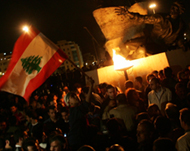Jumblatt chides Hizb Allah
Walid Jumblatt, the veteran Lebanese politician and Druze leader, has accused the Shia group Hizb Allah of helping to keep Lebanon a hostage of Syria.

Jumblatt, the leader of the Progressive Socialist Party who of late has stepped up the rhetoric against Syrian influence over Lebanon’s security and intelligence networks, on Sunday called on Hizb Allah to prove its loyalty to Lebanon above Syria.
Nevertheless, the two pro-Syrian Lebanese Shia groups, Hizb Allah and Amal, are reported to be poised to end their cabinet boycott.
On Sunday, Fouad Siniora, the prime minister of Lebanon, held a meeting with the two groups as part of a continuing attempt to break the political deadlock.
Elsewhere, the patriarch of the Maronite Catholic Church urged Lebanon‘s president to consider his position – and make a decision that would reassure the nation.
President’s call
In a sermon on Sunday, Cardinal Nasrallah Sfeir came closer than ever before to suggest that Emile Lahoud should resign as president.
Lahoud, a supporter of Syria, has come under renewed pressure to step down from the anti-Syrian majority in parliament since a newspaper editor was killed this month in a bomb attack, the latest on prominent opponents of Syria.
 |
|
Lebanese students last week |
With Lahoud sitting before him in a church in Bkirki, northeast of Beirut, the patriarch said that resignation was the president’s call.
Sfeir then said: “We can only pray to God to inspire you to do what will preserve the dignity of the president and the presidency, and what will reassure the Lebanese.”
A spokesman for Lahoud said the patriarch’s remarks would not change the president’s commitment to remain in office.
“There is nothing new requiring a change in the president’s position to continue shouldering his responsibility until the end of his mandate in 2007,” Rafiq Shalala said.
Sfeir has previously rejected calls for Lahoud’s resignation. But he is a strong critic of Syrian influence in Lebanon.
Tueni’s killing
A week ago, a coalition of anti-Syrian legislators and political activists called on Lahoud to quit and for the dismissal of pro-Syrian agents in Lebanon‘s security services.
The coalition was angered by the assassination of Gebran Tueni, the politician and general manager of Al-Nahar newspaper, on 12 December.
In other developments, Amr Moussa, the Arab League secretary-general, has rejected accusations he is working on a deal to clear the Syrian government of blame for the killing of former Lebanese prime minister Rafiq al-Hariri.
 |
|
Moussa says he is merely to |
Moussa is on a stated political mission to ease tensions between Syria and Lebanon, whose relations have deteriorated sharply in the wake of assassinations and attempted assassinations of a number of prominent anti-Syrian politicians and journalists in Lebanon, starting with al-Hariri on 14 February.
On Thursday, Lebanese MP Wail Abu Faur, an ally of the slain former prime minister, said Moussa was not welcome if his mission was directed at absolving Damascus of responsibility for al-Hariri’s death.
Unfounded
The Arab League chief on Sunday described as “completely unfounded” the idea that the pan-Arab body was working on a deal whereby the inquiry into al-Hariri’s murder would be closed in exchange for an end to further assassinations in Lebanon.
“A deal that would conceal the truth in this affair was never even considered,” Moussa said in a statement.
He said he would continue his efforts to “defuse the dangerous tensions in Syrian-Lebanese relations” and said talks were under way on the issue of the two countries’ borders.